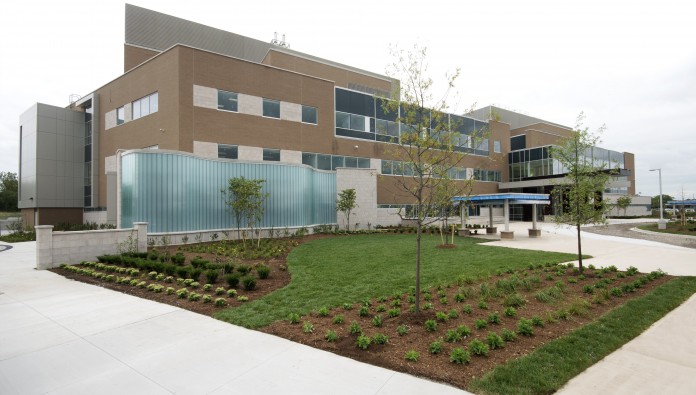Dignity after decades – a new era begins
London’s long-awaited new mental health care facility opens in November
When London’s new, innovative mental health facility officially opens on November 16, 2014, St. Joseph’s Health Care London will continue a strong tradition of providing the best possible mental health care services to the city, region and province. Compassionate patient care will be provided in a new, hope-inspiring environment that will help foster social interaction coupled with privacy, dignity and recovery.
Patients will progress in their rehabilitation journey with a team of expert care providers in this specially designed facility with light-filled rooms and corridors, welcoming colours and private patient bedrooms and bathrooms.
“Buildings don’t provide care; people do. However, the impact of environments on healing, the capacity to teach and conduct research, and our environment cannot be underestimated. We are inspired by the people who need our care and all those who reach out to support them. This place lifts everyone up,” says Dr. Gillian Kernaghan, President and CEO, St. Joseph’s Health Care London
At a glance – St. Joseph’s new mental health care facility
- 460, 578 square feet of healing, therapeutic space
- 10,000 square feet of research space
- Capacity for 156 inpatient beds
- Built to facilitate a progressive recovery journey for patients
- Foster dignity and excellence in treatment and care
- Gold Level for Leadership in Engineering and Environmental Design (LEED)
- Facilitating more than 83,500 outpatient/outreach visits each year
She always comes back
Just before Christmas in 2009, Barbara Emmons was shocked to find the police in her living room explaining that her daughter had a mental illness.
When Kimberly Emmons was only 13 she began hearing voices – and she ignored them. With aspirations of becoming a paramedic the teen kept the strange utterances to herself, afraid her dream would be dashed if she told anyone.
By the time Kimberly was 17 she was having visions and hearing voices daily. “It wasn’t until the police were in our living room that we knew something was wrong,” recalls Kimberly’s mom, Barbara.
After waking up in a bathtub with a razor blade and no recollection on how she got there, Kimberly confided in a counsellor at her college. For Kimberly’s safety, the counsellor notified the police. “I knew my illness was uncovered. Actually, I was somewhat relieved.”
Her family was shocked. “I didn’t recognize any warning signs,” says Barbara. “She was doing incredibly well in school – her grades we in the 90s. With Kimberly it wasn’t obvious.”
Kimberly was admitted to hospital and eventually transferred to St. Joseph’s current mental health care facility, where she started down the road to recovery during a six-month stay. Diagnosed with schizophrenia, there would be many more hospital admissions, including emergency treatment for episodes of dissociation – a complication of her illness.
“Dissociation is a disruption of and/or a discontinuity in the normal integration of consciousness, memory, identity, emotion, perception, body representation, motor control, and behavior,” explains Kimberly’s psychologist Dr. David LeMarquand. “It’s a challenge because such experiences can be distressing. Right now we are treating it by building an awareness of triggers and managing dissociative periods through varying techniques. We are also working through traumatic experiences that may have contributed to the occurrence of dissociative episodes.”
Those episodes are the hardest, says Barbara. “I never know what is going to happen next. It is scary and heartbreaking. During these periods Kimberly harms herself. She has been in the hospital with burns and stab wounds, and one time she almost lost her vision. She doesn’t even remember it happening.”
Visiting Kimberly in the “drab and old” environment of the current mental health building, which was built in the 1960s, was also among Barbara’s lowest moments. She is thrilled with “uplifting” brightness of the new Mental Health Care Building on the grounds of what will soon be known as the Parkwood Institute. “Doctors and nurses, who have always been wonderful, can be more effective and efficient and patients and families will be more comfortable,” says Barbara.
Through the support of her interdisciplinary care team at St. Joseph’s, Kimberly has made some dramatic steps forward. There are also steps backward but Kimberly, her care providers and and her family have a plan to ensure she notices early warning signs. Remarkably, Kimberly’s illness has galvanized this caring family, bringing them closer.
“You have to laugh, and sometimes you have to cry,” says Barbara. “But I always know with time, medicine, hope, rest and treatment, Kimberly always comes back.”




